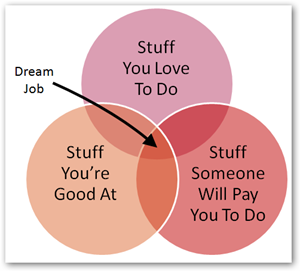
Getting your first job is really exciting—you have real-world responsibilities, and real-word money that you earned yourself, probably for the first time. In your teen years especially, the independence that comes with a part-time job is especially appealing. You get out of the house, meet new people, forge professional connections, and make your own savings and spending decisions.
But you probably have a lot of other things on your plate as well: school, extracurricular activities, family, friends, even college applications. How do you know whether getting a job is a good idea? In this post, I'll talk about the things you should consider before submitting those job applications. Hopefully you come away from this post with a better idea of whether getting a job is right for you.
Why Do You Want to Get a Job as a Teenager?
First, it's important to consider your motivations for getting a job. Some motivations will lead to more productive and more valuable work experiences than others.
-
Do you want to learn to develop good financial habits?
-
Do you want to gain valuable real-world professional skills?
-
Do you want to keep busy and try something new, especially during summer vacation?
If you answered yes to one or more of these questions, you're on the right track. You're likely intrinsically motivated to participate in real-world work experience, which leads to valuable experiences in domains both professional and personal.
- Do you feel you should get a job just to put on your resume?
It's true that having a job looks good on your resume for college applications. But if you're not intrinsically motivated to seek out work experiences, chances are you won't learn or gain much from a part-time job. You're better off focusing on your main responsibilities: your academic performance and your extracurriculars. If you are still interested in seeking out non-academic activities, think about looking into volunteer opportunities where you can develop your own unique interests and passions.
What Are You Looking For in a Teen Job?
I've put together a list of different professional skillsets that you can hone and develop in different employment settings. This isn't an exhaustive list, but these skillsets are generalizable across different fields and levels of experience. Even for entry-level positions, you'll want to consider which of these skills you could pick up as an employee:
- Responsibility—Most jobs require some degree of responsibility from employees. More advanced expectations of responsibility would require you to learn quickly, take initiative on projects, and even teach or train others.
- People Skills Development—If you deal with a customer or client in any capacity, you'll be learning to work on your people skills. If you work in a service position, like as a sales associate or waiter, you'll be presented with challenging people skills issues on a daily basis. Some individuals really thrive on these one-on-one interactions, while others don't. What do you think you prefer?
- Teamwork & Collaboration—You'll develop collaborative skills if you're expected to work with coworkers to tackle projects or problems. Do you work better alone, or you enjoy working in groups? If you're a more solitary person, try challenging yourself by looking at jobs that require you to work collaboratively.
- Leadership Skills—You can find jobs high in leadership skills development where there's "room for growth" once you've proven yourself. In a restaurant, for example, almost everyone started off as a busser—you have to prove yourself to work your way up to host or waiter.
- Professional Development—If you hope to gain a lot of professional connections, or experience in a very particular field, you'll want a job that can provide the most in this domain. It might be difficult to find a paying position as an entry-level teen, but the payoff can be worth it in the long run.
Great jobs—even entry-level ones—will hit several of the above points. Before you think about submitting job applications, brainstorm which job qualities are most important to you. They'll really speak to the types of jobs that you'll gain the most from.

A lot of adults are still on the hunt for their dream jobs; you can get a head start!
How Much Time Should You Commit to a Part-Time Job?
There's no one right answer here—it really depends on your other commitments.
First, you need to consider teen working restrictions in your state. Many states set maximum working hours/time restrictions for teens, especially during the academic year or on school nights. You can Google search "[your state] teenage labor laws." If you're already 18, none of these restrictions should apply to you.
Second, you need to consider where this job will be on your list of priorities. Your own well-being should always be your #1 priority; if your schedule is over-burdened with countless activities and sports and a job, you'll be doing yourself a disservice. Spreading yourself too thin means that quality of performance will suffer somewhere, whether it's your schoolwork or your athletic team or your family life. Focus on quality, not quantity—at at the risk of sounding a bit preachy, make sure you're getting enough sleep!
If you're interested in getting a job because you want to develop professional connections, or because you've found a position that aligns with future career interests, you might want to invest more time in it. Jobs like this serve you well in the long term for many reasons:
-
You develop basic employment skills, important for any resume
-
You can check out a career path early on to see if it's something you're interested in pursuing further
-
You may find yourself a trusted mentor or advisor in a field that you find interesting
-
You may pick up more specialized or unique skills that make you a stronger job applicant in the future, or even a more interesting college applicant

Picking up a unique skillset will make you a stand-out applicant in the future.
Only you know what your schedule can handle, but think carefully about what you're willing to commit to before you even start looking at jobs. It's much easier to under-commit and take on more hours than it is to over-commit and then have to cut back.
When I was in high school, I had a lot of academic and extracurricular responsibilities: I took several AP classes, participated in after-school sports, played an instrument in orchestra, and joined several clubs. On top of all this, I thought it would be a great idea for me to commit about 10 hours a week at a part-time job.
I was able to juggle all these responsibilities, but barely—and I was exhausted all the time. I realize now that I didn't have to prove anything by taking on another commitment, and I should have either limited my hours to the weekends or not worked at all while school was in session. During the summers, though, I worked part-time and loved it—I would have gone crazy if I didn't have something to do, and I got to experience a more independent lifestyle the summer before I left for college. Only you know what's right for you, but I hope you can learn from my experiences!
Some Examples of Rewarding Jobs
If you think that taking on a part-time job is the right thing to do, you'll want to start thinking about what you actually want to do! Here are some examples of fulfilling part-time jobs for teens to get you started.
- Tutoring—Gain experience as a mentor in a subject area you're skilled in, and learn to work with clients one-on-one. Offers opportunities to develop strong professional relationships.
- Animal Shelter Work—Working with animals is a lot of fun, and a lot of responsibility—these creatures are completely dependent on you for their care. This is an especially great option if you're considering veterinary work.
- Administrative Assistant—Small businesses and law firms often need help with administrative tasks. It might not be especially glamorous, but you get to learn the ins and outs of a particular business, all while developing your professional network.
- Babysitting—It's a big deal when parents entrust you to care for their kids; it can also be a lot of chaos and fun. If you are interested in working with infants or kids in any capacity in the future, it can be a huge plus to have babysitting experience. Babysitting is also a great side job through college, so the more work experience you have, the easier it'll be for you to find work in the future.
- Research—Labs at local universities often need help (sometimes paid, sometimes volunteer) implementing research, or with administrative tasks. If you find an opportunity like this in a field that you're interested in, I would strongly encourage you to check it out! It's a great opportunity to meet incredible grad students and professors, work on very cool projects, and put something especially impressive on your resume.
What's Next?
Interested in getting a job, but not sure whether your academic performance is strong enough? Learn more about what your GPA means, the average high school GPA, and how your grades affect college admissions.
Want to improve your SAT score by 160 points or your ACT score by 4 points? We've written a guide for each test about the top 5 strategies you must be using to have a shot at improving your score. Download it for free now:
Have friends who also need help with test prep? Share this article!

Francesca graduated magna cum laude from Harvard and scored in the 99th percentile on the SATs. She's worked with many students on SAT prep and college counseling, and loves helping students capitalize on their strengths.



































 Holly R.
Holly R.